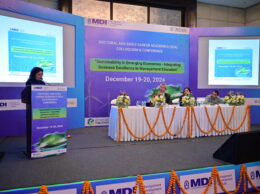New Delhi: In its efforts to remain relevant and globally acceptable, National Assessment and Accreditation Council (NAAC) has revamped its accreditation framework. The introduction of Student Satisfaction Survey (SSS), onsite assessment -peer review by visiting teams, data validation and verification (DVV) and pre-qualifier score, and introducing system generated scores (SGS) are hallmarks of the revised accreditation framework.
The Revised Accreditation Framework which became operational in July 2017, is ICT enabled, objective, transparent, scalable and robust. The new framework is a subtle combination of System Generated Scores (SGS) with a combination of online evaluation (70%) and Peer evaluation (30%) which would usher in high level of transparency.
The introducing the element of third party validation of data and providing appropriate differences in the metrics, weightages and benchmarks to universities, autonomous colleges and affiliated/constituent colleges are another features of the accreditation framework.
The most significant point of the new framework is revising several metrics to bring in enhanced participation of students and alumni in the assessment process. The introduction of Student Satisfaction Survey (SSS) is an attempt to engage students who are the main stakeholders in the quality assurance process. The SSS is conducted concurrent to the DVV. The scores obtained in the SSS will be part of the overall CGPA.
Before finalizing the revised accreditation framework, NAAC has conducted several rounds of stakeholder interactions, a National Workshop and Meetings of several Working Groups for the preparation of the Manuals for Universities, Autonomous Colleges and Affiliated Colleges. The draft framework was pilot tested on select Higher Education Institutions (HEI’s) across the country.
A National Consultation on the Revised Accreditation Framework was held on 25 April 2017 at New Delhi. Mr Prakash Javadekar, Minister for Human Resource Development, Government of India, inaugurated the programme in which eminent academicians and educationists actively participated.
The Revised Framework is more ICT intensive and ‘outcome based’. The current grading pattern of NAAC (A++, A+, A, B++, B+, B, C, D) would be continued for accreditation. A system of applying minimum qualifiers for achieving a grade has been designed and will be implemented. For example, Universities should score a minimum of 3.01 in Criteria 1, 2 and 3 for achieving a “A” “A+” “A++”grade.
The further details on the process and formats for submission of online Institutional Information for Quality Assessment (IIQA), Self Study Report (SSR), Student Satisfaction Survey, Fee structure etc. are available on the NAAC website: http://www.naac.gov.in/.









